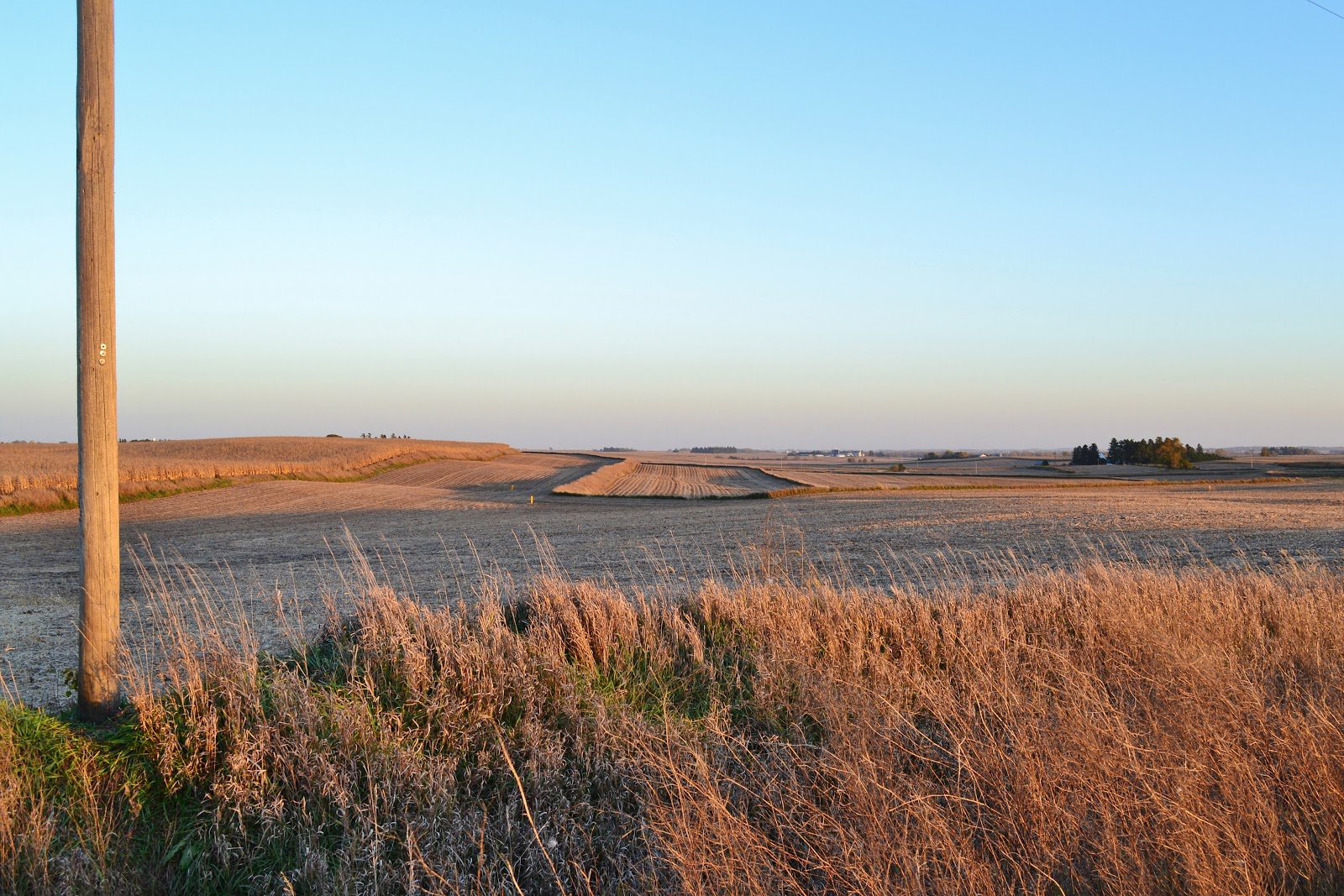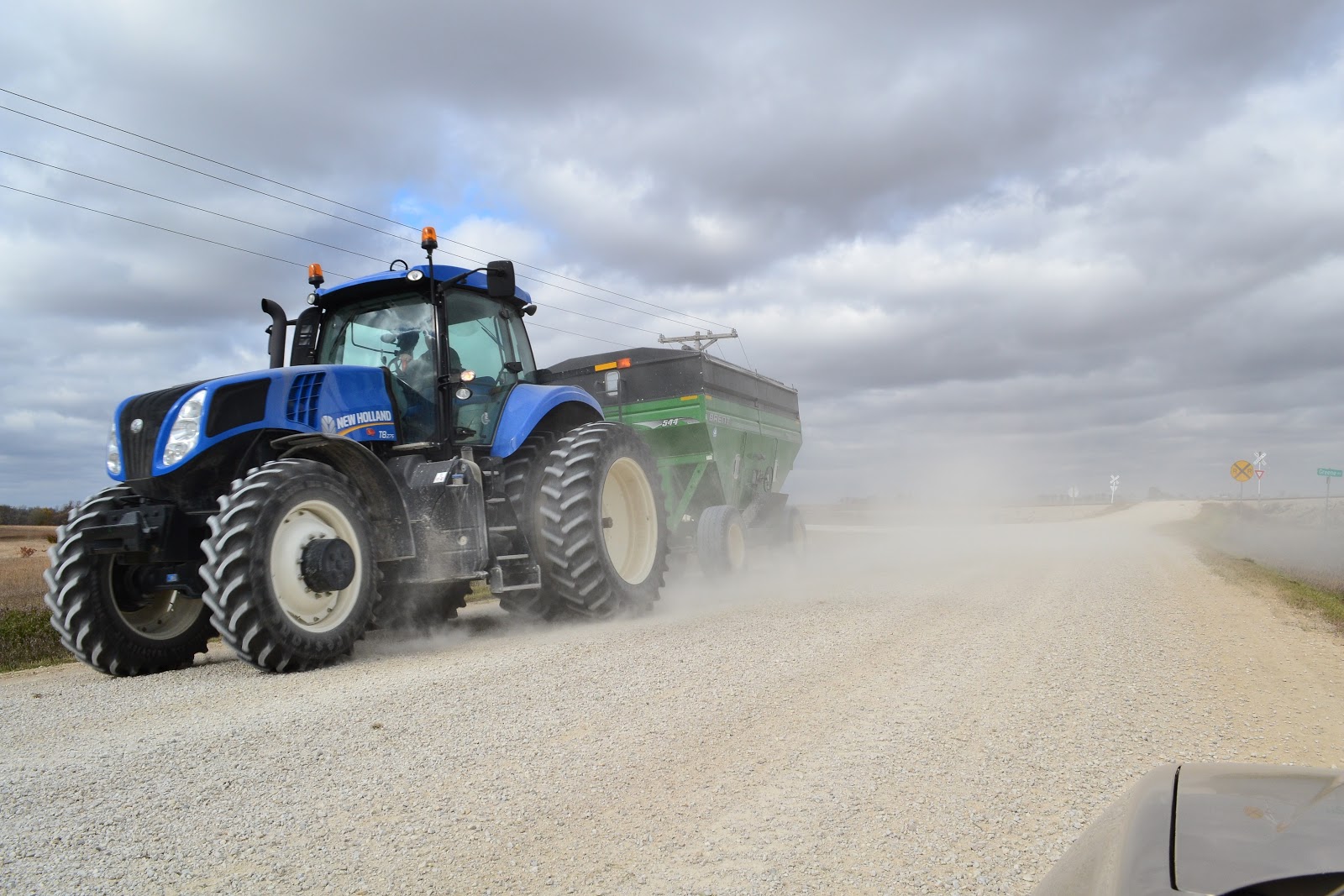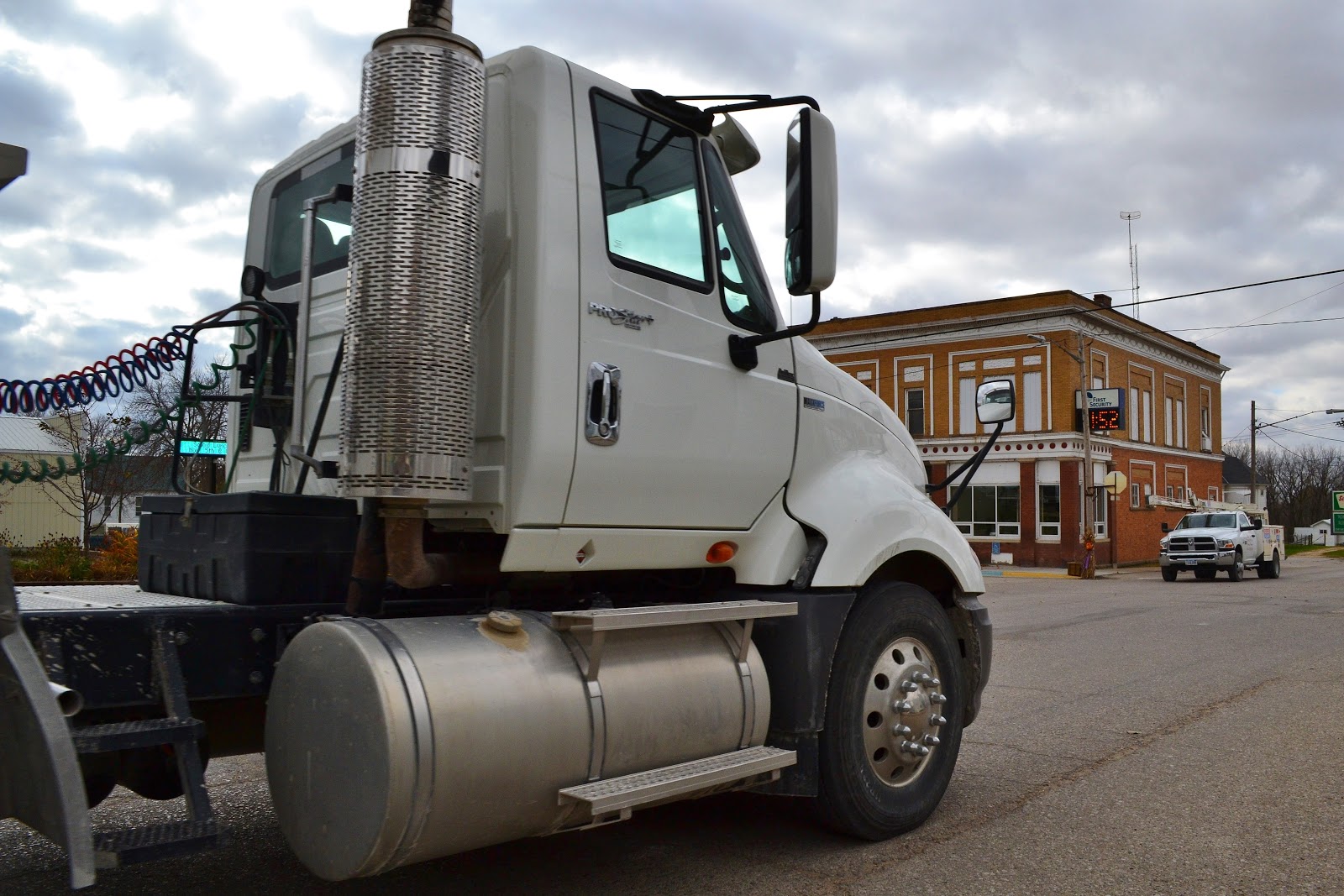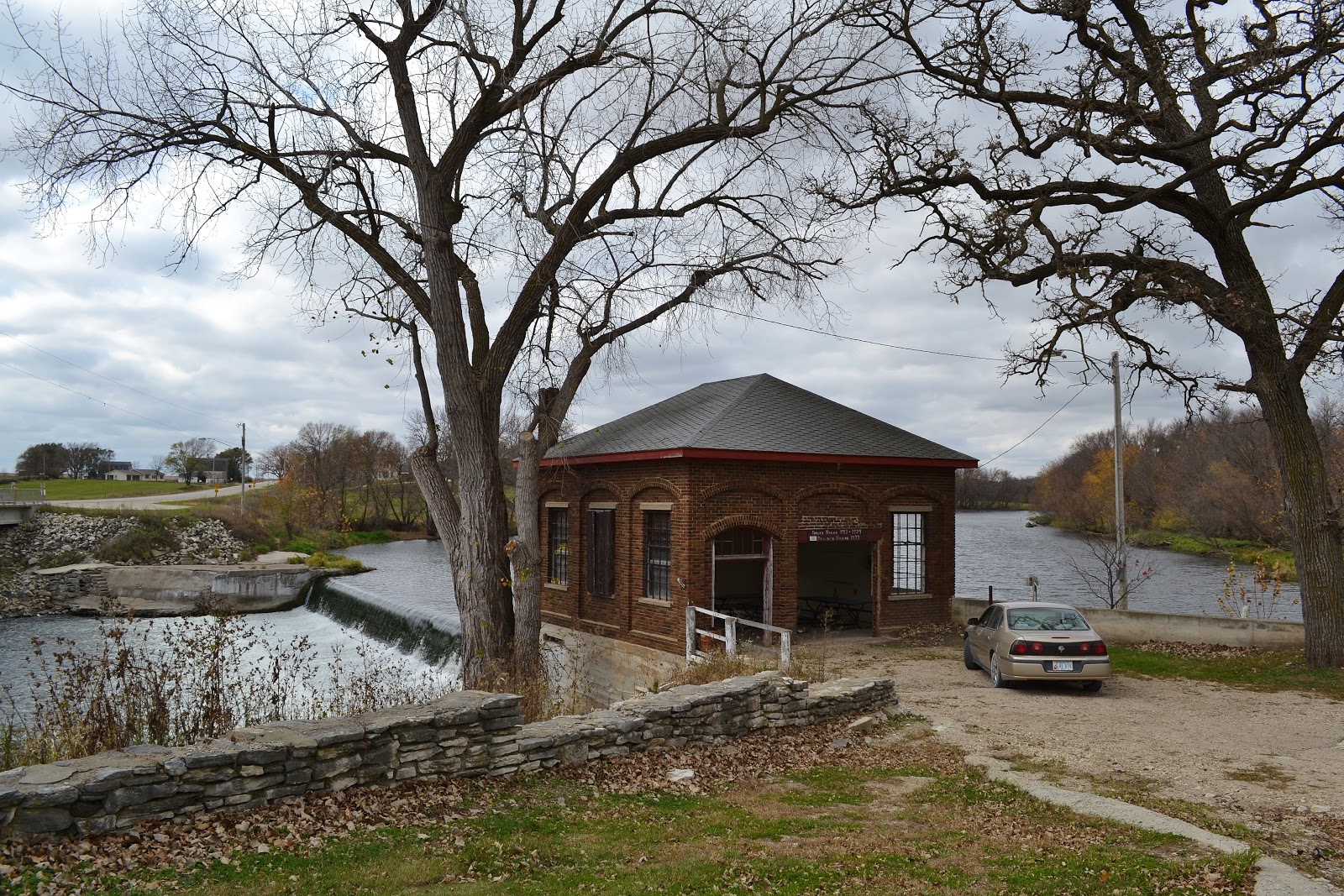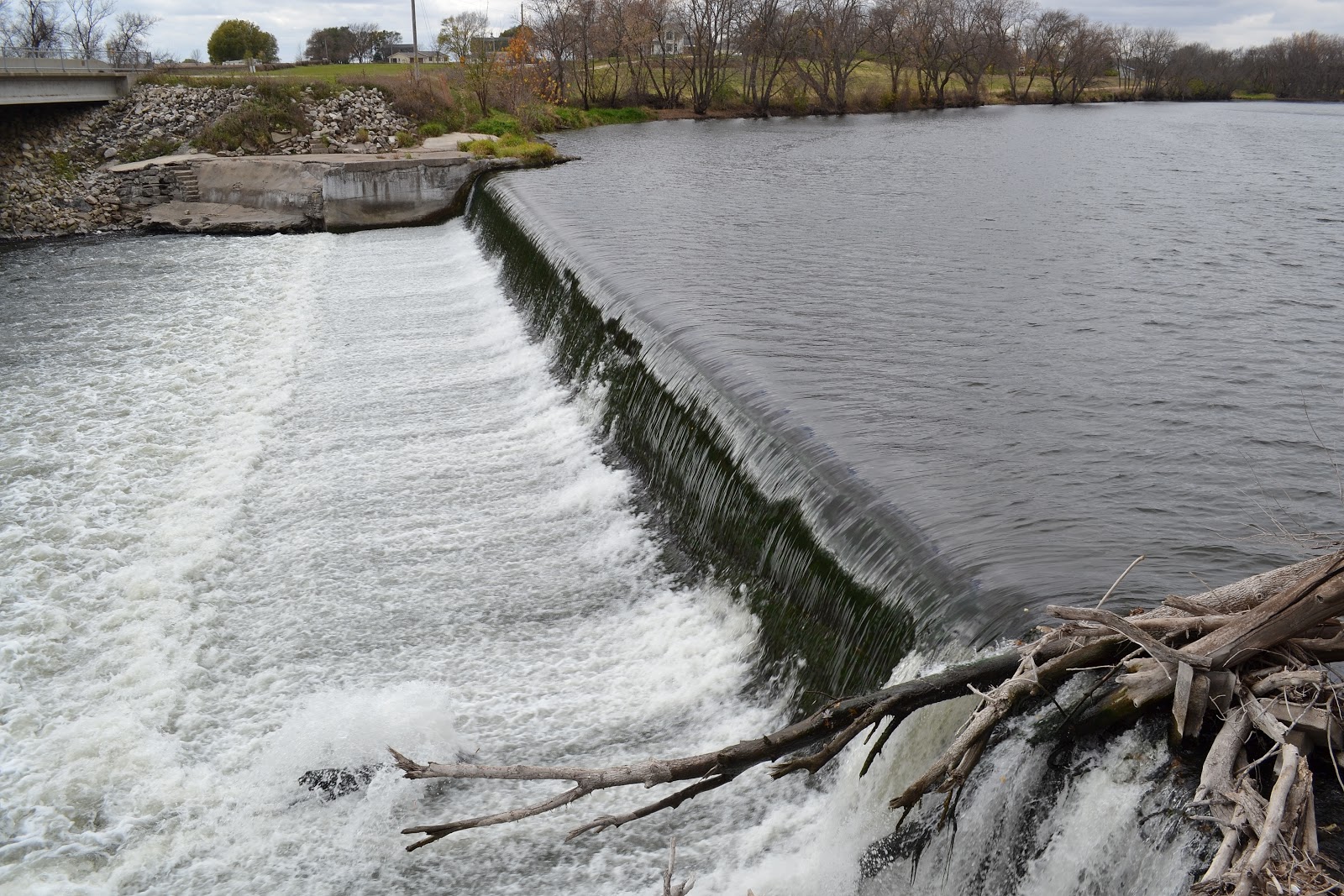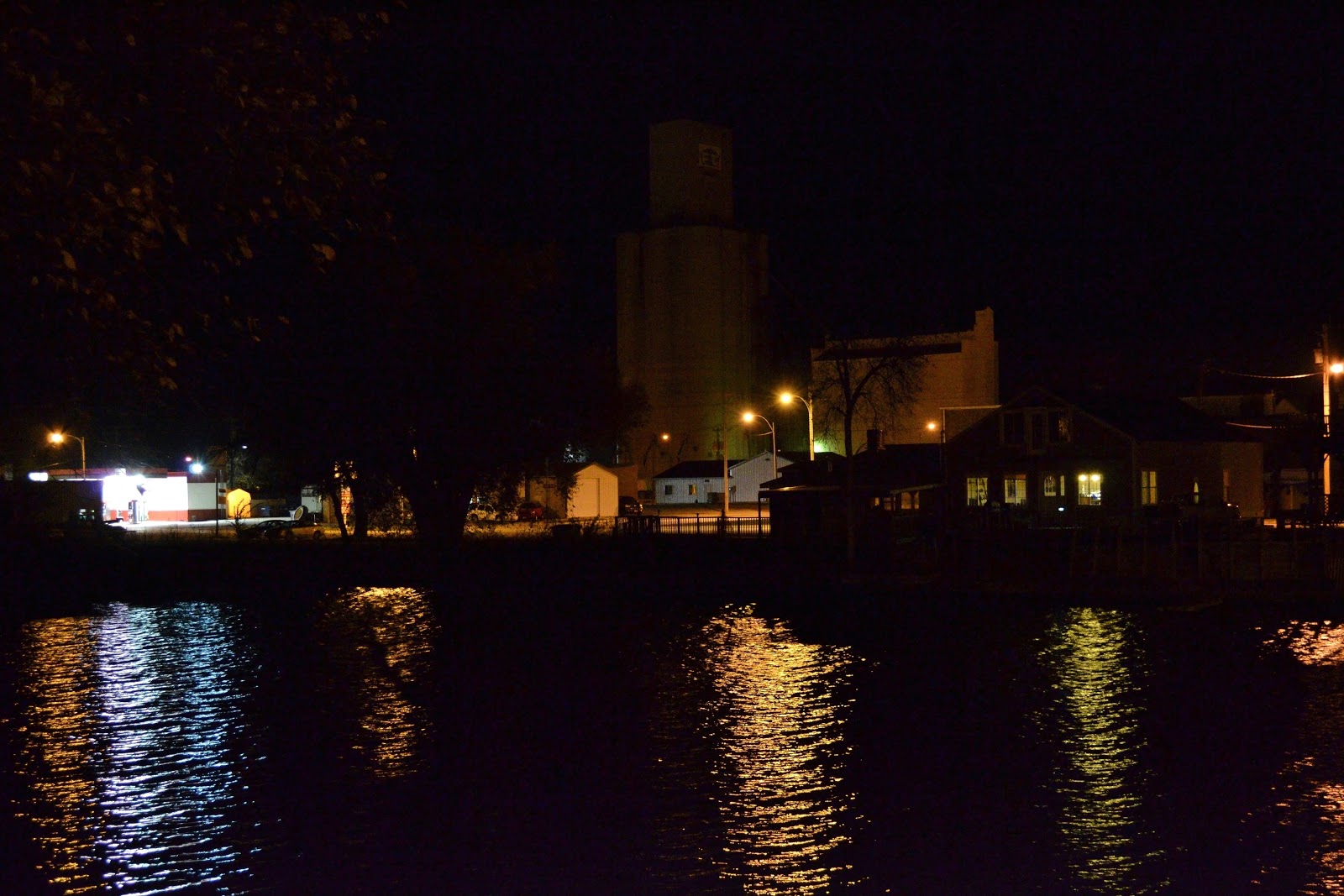This installment of the
Here Photo Series about the Real Iowa is a combination of two days of
moving generally northeastwards from where I last left off.
Before we get to 10-19
however, I have included 14 pictures that were taken during the
interim between sessions. Then, there are 48 photographs taken 10-19,
and 68 photographs taken 10-28 -- for a total of 130.
The series will continue
into the winter time.
*************************
This picture is taken
close to home, by Goldfield. The road graders are constantly working
on the county dirt roads in all 99 counties, during good weather. We
will see another one of these in Floyd County later.
Also, this is the real
coloration; but there was so much saturation in the original that I
had to reduce it considerably.
'Saturation' is the
intensity of colors, not the hue or tint of the colors.
Another view of Eagle
Grove. Note how green the corn is. By the time I took pictures on
10-28, all of that green had subsided into gold and yellow.
North Wright County, and
what caught my attention was a bunch of rabbits in the grass and on
the road. My real goal was to get a shot of the ever-illusive
herons, that constantly avoid having their pictures taken. Not that
they are hyperactive about it, they can only fly away at one mile an
hour anyway; and I have never seen a heron fly further than a few
hundred yards. They are not like the Great White American Pelicans
that will fly twenty miles between lakes just to attend water sports
tournaments.
Hah! I got a picture of
one at the swamps in the Rolling Hills.
I stopped next to a
curious woodchuck and took his picture.
Still looking for herons,
I went past Morse Lake and took two pictures of Canadian Geese.
I found some more herons
at the South Morse area; but that was it for the summer of 2014.
Weeks later, I stopped for
a few minutes at the town of Hubbard in Hardin County. No sooner did
I stop, then I realized that there was a harvester coming at me from
the west. I quickly took some photographs. Until 10-19, I was busy
working and writing; and I did not have time for any further
pictures.
Here begins the collection
from 10-19. I was heading for Greene, which I never reached that day,
with the intention of moving easterly to Guttenberg (which I don't
think I will reach this year) -- and suddenly I came across a very
picturesque part of the West Fork Cedar River greenbelt north of
Hansell, in Franklin County near the border with Butler County. I
began to sniff out the area like a hound searches for a bone, and
after half an hour I realized that the place was great for
photography. My previous plan went out the windows, and I knew that I
would be in this area for most of the daylight; but I needed boots,
which I was lacking.
I broke some land speed
records driving back to Hampton (which I had just stopped at for
supplies) and ran into the Shopko where I bought better boots than I
usually would have paid for -- and then zoomed back to this point to
take this panorama picture of the area.
As is always the case in
Iowa, you cannot tell what is there until you get there. You can see
the greenbelt in this picture, but only the most general features of
a place are apparent out here. So, the details always bring
surprises.
Next to the greenbelt now.
As this is harvest time,
there was a lot of agricultural traffic along the road; also since it
runs through the greenbelt from one large area of fields to another.
By 'large' I mean counties.
Officially, this stretch
of greenbelt is called the Westfork Wildlife Area Wetland Tract of
Franklin County. At this point, I followed a tractor to a bridge over
the West Fork and took some pictures there.
Further upstream.
This area is on the same
river, but a little further upstream and cannot be seen in the
panorama.
These pictures, prior to
going into the greenbelt, are very special. Not so much for the
photography, but for the subject matter. This is genuine prairie --
seldom seen anywhere else. This is what Dances With Wolves went west
to find. This is what used to cover the Great Plains.
I have to suppose that
'City People' have no clue as to what is going on out here in the
real world. Well, at an area like this, there is not usually so much
traffic. There are weeks during the growing season or during winter
when I would be the only vehicle on the road for hours at a time.
However, this is the end of the growing season and now the crops must
be harvested and moved immediately to their drying stations. The corn
does not go immediately to large grain elevators -- those tall
concrete structures that you see in my pictures. The corn has to be
dried out first, before it can be stored in massive quantities.
Otherwise, you will get rot and fermentation at the bottom of the
silos (elevators).
After the corn is dried it
is then moved again to large elevators or silos. That keeps the
pygmies busy.
The grain hauler trucks
are very numerous this time of year, and are always working year
round anyway. There is an old saying from Africa about the Lion and
the Pygmies. The Lion's roar is great and tremendous, but the paths
through the jungle are worn smooth by Pygmy Armies. To me, the
pygmies are the grain haulers. Forever busy, forever on the go,
forever in the way, forever wearing down the roads; and usually
wherever the pygmies can go I can go.
I took quite a few shots
of this, due to the colorations and to make screensavers for my
readers. I have not changed the saturation of these, but you can if
you wish.
Now, we go into the grove
to see what it looks like from the inside. The greenbelt is further
through the trees, and we will keep moving in that direction.
This is the border of the
greenbelt, hidden by the outer groves. As you can see it is very
thick going here. That is typical of the ecology borders of a
greenbelt. Further into the greenbelt the undergrowth rapidly
disappears.
Still moving towards the
river.
This is what I was looking
for.
I take pictures like this
to be complete about what I am doing, and if it interests me. I took
thirty shots of this, with various leaves falling into the scene.
The next three pictures
were taken as I walked downstream.
I was beginning to lose
the light in there, so I decided to break out and get some evening
pictures of the area. With this photo I had to turn down the
saturation to make it presentable. People just would not believe the
colors as they really are.
Close by, is a farmer in a
harvester working in a field of soybeans.
Further upstream, I turned
west and then went back along the greenbelt southwards. I took this
picture because it is so typical of the kinds of buildings situated
near the greenbelts; and I would not want to live there, because it
is on the wrong side of the trees. This is the west side. The howling
winds and thunderstorms come from the west and the north.
I started to roam about in
a general southerly direction. I came across this well organized
farm, with cattle and a lot of activity. This is a typical harvest
time scene. Remember, the vast majority of corn is not grown for
People -- that kind of corn is called Sweet Corn, just like drinkable
water is called Sweet Water. Most corn is for the livestock, and an
increasing percentage goes over to the Ethanol Plants.
This is a healthy looking
farm, with all of the indications of up-to-date management.
I side with the farmers on
a lot of issues -- except for those god-damned buttugly windmills.
One of my grandfathers was an Irish Farmer in Michigan, and I have
always been aware of the farmer's blood in my veins. I suppose I
should qualify that statement. I have great sympathies for the 'small
farmer' with 10,000 acres or less (100 acres on a side).
I have little sympathy for
the Massive Big Business Farmers. For one reason, because they drive
up the prices of farm equipment -- because they have the money to
spend, and it makes life more difficult for the smaller farmers,
which forces them to sell out to the Massive Big Business Farmers --
who are heavily invested in the Big Business of Expensive Farm
Equipment.
Today, a new Harvester can
cost up to $400,000.
That is -- FOUR HUNDRED
THOUSAND DOLLARS!!!!
For a machine that I
wouldn't spend $100,000 on. Now, of course, that brings a lot of
laughter from the Massive Big Business Farmers; but if I was a
farmer, I would build my own harvester anyway -- so it is a moot
point there.
The case is, Massive Big
Business Farming is in bed with the ButtUgly Windmill Industry up to
their eyeballs. While the BUWIs are biting one end of the pillow, the
MBBFs are biting the other end; with both trying to sucker the small
farmers into putting their Sphincters-In-The-Sky on small farmlands.
I like this one. All over
the Midwest this scene is duplicated tens of thousands of times.
Harvesters sleep in the fields where the next work has to be done.
With the sun fading fast,
I decided to call it a day as I had a lot of other things to do back
home. I stopped here to take a long shot of the farm in the
background.
Then, I noticed that there
was a deer in the foreground munching on some corn leaves -- the deer
version of tortillas.
This picture shows the
terracing that is used in the Midwest to reduce soil erosion. This is
also a very typical Iowan view -- classic. You will notice the usage
of Norway Spruce in the islands. They are always the highest trees
and have that classic evergreen shape. Without the Norway Spruce
there would be almost no evergreen presence in Iowa.
Now starts the photography
for 10-28. This is in the town of Greene, which we will return to
later. My plan is to drive along the Shell Rock River, northwards to
the town of Marble Rock where I remembered there being a view of the
river and a spillway.
Marble Rock is about the
most typical of small Iowa towns, except this one has a convenience
store which a lot of them do not have. Compared to the average small
Iowa town, my town of Eagle Grove is almost palatial with three
convenience stores, a supermarket, a dollar general store, a hardware
store, a lumber store, an auto parts store, three banks, two
restaurants, a subway, a department store, two mexican restaurants, a
pharmacy, a medical clinic, a fitness and therapy center, a furniture
store, two bars (at least), a sports shop and I think there is a
chiropractor there somewhere.
While I was snooping about
the town for photos to take, I kept hearing a dog protesting. I found
him, and he immediately shut up and posed for a picture.
This is what I remembered
was here. Many moons ago, I visited Marble Rock in the summertime; it
was like a trip to Ireland because it was so green and lush with
vegetation. This is a high spillway as they go in Iowa. Aside from
Woodman’s Hollow, I am not sure if there is a real waterfall in
Iowa; water sliding down rocky cliffsides, a waterfall does not make.
The Shell Rock is not a
large river, but you can see how powerful even a small river can be
when under control. Now, imagine that much water pouring over the
banks into a town during a flood. It happens, to any size of
watercourse here in Iowa.
This is the next best
thing I remember about Marble Rock.
On the way to Marble Rock
I passed a grader. This is the same one, parked at the only store in
town. Once again, this is all classic Midwest scenery; trucks,
tractors, graders, haulers (etc) all occupy the roads and towns
during the harvest season.
Marble Rock from the east.
These next four
photographs all look south as I travel east. My goal now is to leave
Floyd and Butler counties and to go into Chickasaw County beyond
Nashua.
This is Nashua from the
west. I have to go in there for supplies anyway, so I will take some
pictures too.
Now, I am definitely in
Chickasaw County; and this is the Cedar River north of Nashua. I have
only enough time and light left to make a beeline across the county
heading due east.
The 28th was a very mixed
day for light and weather. Generally, the skies off to the south were
clear; but over me there was a great agitation of clouds that
sometimes allowed large swaths of brilliant light to pass through.
Still on a course due
east.
The road came to an end,
and I chose to go south; that was a good choice since it brought me
to a view of two harvesters at work -- one on the hillside with me,
and one further down in the valley.
This is one of those
photographs that only comes along once in a lifetime.
I turned around and went
north and then east again. My intention was to find Ionia.
Ionia.
This church in Ionia was
blasted by a ray of light while I was on the main street trying to
photograph the mill. I could see from blocks away that the whole
building was lit up like a beacon. I have darkened the picture and
reduced the saturation so the church can be seen clearly.
I left Ionia and headed
southeast for the Wapsipinicon -- the Dark Beauty of Iowa Rivers.
Near the river, I took these photographs. As you can tell I was
primarily concerned with light study.
As I continued to wander,
I became more impressed with Chickasaw County. I left off taking
photographs and explored various parts of the county. Chickasaw is so
scenic that I will have to return here in the winter time to see if I
can get some classic snow scenes, or if I am lucky some winter storm
scenes. Also (if it happens), a session on a clear day after a snow
storm, with picture postcard shots that you could sell to your
grandma.
Finally, well after
sunset, I found myself back at Greene in Butler County. I decided to
try some long exposures.
My night photography
abilities are next to nil. It is not that I do not know how. It is
because I do not have the equipment yet. Plus, when I do get into
night photography I will not be using infra-red or artificial
lighting. And, I do not want the pictures coming out as sepia like
these are. So, I will have to get a very special camera.
You should know that the
Human eye is still very much better at seeing various shadings of
light and contrast and depths than any camera is so far. There are
many pictures that I would like to take, that just do not come out
right with cameras, as the scenes are not collectively bright enough
for the camera sensors to pick up enough light and then differentiate
-- therefore I have to memorize them. By that I mean, the sensors are
not as sensitive as the Human eye; and that means the sensors cannot
tell the difference between various shades and textures of lower
light. Due to that, many great pictures are lost to us.
On the bridge over the
Shell Rock. I did not mean to take this one, I was just checking the
focus reactions; but I kept it anyway.
So, there I am taking
shots of downtown Greene; and for some reason I glanced downstream
and was surprised to see a Man standing in the river. He was fishing.
This is on the opposite
side of the bridge from the Fisherman. This is for screensavers.
I wondered about taking a
picture in the car, without a tripod. This is the best I could get. A
tripod arrangement would have helped.
I do not have the
equipment for good night photography. I want to get into it a lot,
but it will require research. This is also taken by the Nikon that
took the rest of the pictures, using the Auto w/o flash control.
These three show you what
the typical nightline looks like in the Real Iowa. Compare this with
the clutter and disparagement of a city nightscape. Those red lights
on the left horizon are buttugly windmills. They flash red all night
with an ugly display that I call 'Night Measles'.
These were taken from an
overpass above I35 north of 20. What you are seeing is the lights of
big trucks driving under the overpass.
Lastly, Eagle Grove at
night from the east.
*************************
Markel Peters






























































